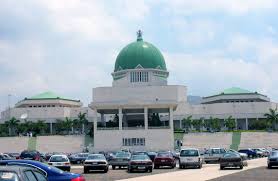**Okays N4trn subsidy, raises oil benchmark to $73,
The National Assembly on Thursday passed an aggregate expenditure of N17.3 trillion as revised budget for 2022 fiscal year which mainly raised recurrent expenditure by Nl98.77bn while capital expenditure was not affected
The amount represented an increase of N192.5 billion from the N17.1 trillion approved and assented to last December.
The passage came after the consideration of a report by the Appropriations Committee on the 2022 Appropriations Bill in both chambers.
Out of the N17.3 trillion passed, N817.6 billion is for Statutory Transfer; N7.1 trillion is for Recurrent Expenditure; Capital Expenditure remained at N5.4 trillion, while N3.97 is for Debt Service.
The parliament also approved revised 2022 fiscal framework, raising the oil benchmark to US$73 as proposed by President Muhammadu Buhari.
The national assembly oil production volume of 1.600 million per day; Petroleum Motor Spirit (PMS) subsidy of N4.00 trillion (NGN); and a cut in the provision for Federally funded upstream projects being implemented by N200 billion from N352.80.
The two chambers also approved the fiscal deficit of N7.35 trillion, an increase of N965.42 billion, representing 3.99% of Gross Domestic Product (GDP).
The incremental deficit, it said, would be financed by new borrowings from the domestic market.
The lawmakers also their own budget (National Assembly) and its agencies to N153 billion from the earlier N139 billion.
The breakdown of the National Assembly votes in the 2022 revised budget are:
While approving an increase in the Federal Government Independent Revenue of N400 billion, the chambers gave its approval for an additional provision of N182.4 billion to cater for the needs of the Nigeria Police Force.
It approved net reductions in Statutory Transfers by N66.07 billion.
A breakdown of the net reductions are as follows: NDDC, by N13.46 billion from N102.78 billion to N89.32 billion; NEDC, by N6.30 billion from N48.08 billion to N41.78 billion; and UBEC, by N23.16 billion from N112.29 billion to N89.13 billion.
Others are Basic Health Care Fund, by N11.58 billion from N56.14 billion to N44.56 billion; and NASENI, by N11.58 billion from N56.14 billion to N44.56 billion
President Buhari, in a letter dated 5th April, 2022, requested the National Assembly to adjust the 2022 fiscal framework.
He said doing so became necessary in view of new developments in both the global and domestic economies.
Lawmakers, who took turns to make contributions during consideration of the report on the review of the 2022 fiscal framework, blamed the country’s economic downturn on crude oil theft.
Senator Olubunmi Adetunmbi (Ekiti North), said the federal government and security agencies owe it as a duty to stop the stealing of our common wealth.
He lamented that at a time when most countries of the world are reaping bountiful harvest due to the increase in crude oil prices occasioned by the Russia-Ukrainian crisis, Nigeria is left out owing to its inability to meet its OPEC quota.
The Senate Leader, Yahaya Abdullahi, who spoke along the same lines as Adetunmbi, said the country should be in a state of mourning over what is currently happening to it.
He attributed the failure of security agencies to protect oil assets as a major reason for the decline of the economy.
He expressed worry over the increasing cases of oil theft in spite of huge resources allocated to the military, police and other security agencies.
Senate President Ahmad Lawan, in his remarks, called on the Federal Government to take “radical” steps towards stopping the theft of crude oil by economic saboteurs.
He also called for a stop to the importation of refined petroleum products into the country, so as to cut down on expenditures incurred in the process, as well as to maximize profits from crude oil sales.
“This (crude theft) is not something to play politics with, and I don’t think the answers are going to be easy to come by.
“Radical decisions would have be taken, but before we find answers we have to live with this, but we have to be fast as possible in looking for answers.
“I had a session with the Chief of Defence Staff about a month ago, and my discussion with him was on the oil theft and the efforts of our security agencies to combat this menace.
“And like we know, our security agencies are doing their best but we have people – our people – who are sabotaging the oil industry, because the oil theft is not perpetrated by somebody else but by people who are citizens.
“I also believe that, whether there is oil theft or not, until we stop the importation of refined products to Nigeria, we will never get the best out of the oil and gas industry,” Lawan said.
Recall that the National Assembly in December, 2021, had approved the sum of N442.7 billion for subsidy in the 2022 budget for the period of January to June this year.
Buhari, however, anchored his fresh request on the fact that PMS subsidy was not been duly appropriated for in the national budget beyond June.
According to him, the development was as a result of the provisions of the Petroleum Industry Act which stops all such payments past the given June deadline.
In another letter dated 12th April, 2022, President Buhari requested the National Assembly to approve an additional N1 trillion to his earlier N2.557 subsidy request to bring the total amount on payments to N4 trillion for the year 2022.
He explained that the additional request was against the backdrop of adjustments to the 2022 fiscal framework which became imperative due to market developments occasioned by the spike in crude prices, following the Russian-Ukrainian war.
The chamber, accordingly, approved the President’s request for additional N3.557 trillion for PMS subsidy with the passage of the 2022 Appropriations Act (Amendment) Bill, Thursday.
It also approved N192.52 billion aggregate increase sought by the executive, and an additional provision of N182.45 billion to cater for the needs of the Nigerian Police Force to enhance their morale.
The Senate, after passing the 2022 Appropriations Act (Amendment) Bill, adjourned till the 26th of April, 2021.




